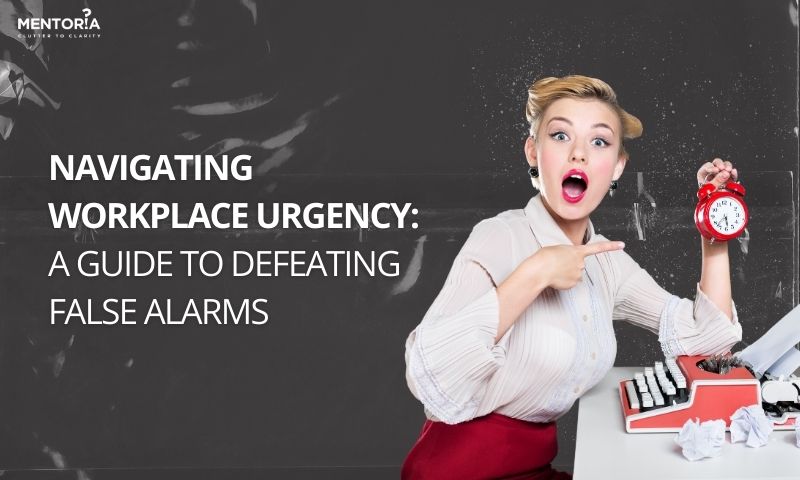Navigating Workplace Urgency: A Guide to Defeating False Alarms

Jump to Section
If there is something that steals our attention, generates stress, and diverts us from a good day at work, it is undoubtedly false emergencies or those daily tasks disguised as emergencies. They are a real thief of everything that helps us work healthily. And they occur more commonly than we think. It is a conscious and active job to identify them and not allow them to manipulate us. False emergencies at work are harmful and it is up to us to stop giving them space and put them where they belong.
What Are False Emergencies At Work
False emergencies are those tasks that seem to have to be done immediately, leaving everything we have in hand or on the agenda aside to attend to them when in reality, they are neither so urgent, nor so pressing, and sometimes, not so important.
Of course, they are so strong (perhaps because they come from a superior, from a certain situation, etc.) that they are capable of manipulating us (and we allow ourselves to be manipulated) and they get us to stop our activity and alter our schedule and day to get to it. Of course, the consequences are much more negative than positive, and usually, solving a false urgency at work does not add but subtract.
Effective Time Management
The great secret to productivity lies in effective and efficient time management. Knowing how to organise tasks, order them according to priority and needs, focus on the work to be done, and avoid distractions are some of the keys that can help when increasing and working on one’s productivity. But without a doubt, one that will help us be truly effective and be able to progress through the day healthily is to avoid those false urgencies at work.
To effectively manage daily work time, we must, above all, know the needs of the day, visualise what we have ahead of us, and be able to prioritise what we have to attend to, when, and in what way. If suddenly, we put our planning aside to attend to something that seems urgent and important, we are disorganising our entire agenda so that later it turns out that in reality, it was not that important and even less urgent.
The effect is always the opposite of what was intended. A priori we thought that solving this would take away a lot of work from us, but the reality is quite the opposite. We have diverted focus, we have taken attention away from what we are doing and we will feel, upon identifying that it was a false urgency, that we have not been faithful to ourselves just because of something that has appeared and that, deep down, could wait.
Effective management of our time is one of the tasks that can bring us the most benefits. And not only in terms of productivity but also on emotional levels. The satisfaction that comes from having done what we should, from flowing with work time and evolving as planned, is a real rush of satisfaction at the end of the day.
How To Identify False Emergencies At Work
The first and most important step when it comes to avoiding false emergencies at work is knowing how to identify them. You have to become a true expert in detecting them to be able to save and avoid them with elegance and without them affecting you. We may avoid them but they take over our attention even though we are not attending to them and that is even worse than stopping what we are doing to solve them and be able to return.
What is sought and intended is to identify them, avoid them, and release them without them stealing even an extra moment of our attention. If we want to learn from the best in this we must search and look at doctors. They know when an emergency is real and must be attended to, leaving everything else for another time or when, although it may seem like it, it is not and it does not steal one bit of their attention. They know how to reorganise their agenda and focus based on what is an emergency and what is not.
To know if a task is urgent or not, you have to assess the consequences it has in the short – medium–long term. Its impact, and its derived effects if done immediately or not. With that, you will be able to assess how urgent it is and how to organise it in your agenda. Whether or not it deserves to stop what you were doing to attend to it or better, include it in your planning.
You can ask yourself questions like:
- Who will be affected if I don’t attend to the task right now?
- Am I blocking the work of others if I procrastinate on that task?
- How much time would it take to solve it? Will thinking about that pending task distract me?
- Can it objectively wait?
- Is it difficult to organise meetings on important topics? If key people can’t make time, chances are it’s not important.
- When an issue is discussed, is the pressure external or are all the problems internal?
- Are the meetings fruitful? If they end with the promise of another meeting, chances are no decision has been made.
- Do they only have time to do “real work” in the evenings or on weekends?
- How many times have we said “This has to be done now” and then we spent months and months without finishing it?
These questions—and many others—can be asked to detect what is important and what makes us rush without any sense. If the conclusion is that there is a false urgency, then we must get to work to eradicate it.
What’s Behind A False Urgency
Normally, two factors generate and proliferate false emergencies at work: bad bosses and the disastrous organisation of tasks.
Bosses are very prone (and not out of real need) to ask their employees to drop everything immediately to attend to what they want. They do not take into account the tasks that the other person is undertaking, if they are busy, if they are focused, or, of course, the consequences that distract them even have for the work itself. The only thing that matters at this point is that they do what they ask.
Dealing with a boss with these characteristics is complicated but it is important to learn and make him see that his urgency is often not urgent and that we need him to understand that we have a focus, productivity, and an established order each day.
Another thief is a poor organisation (which is also usually behind bosses who ask for urgent things when they are not). If we all organise ourselves well, with foresight and order, false emergencies will not appear. There will be emergencies, but real ones because these arise in daily life and of course, at work. You have to be prepared and know how to manage them, not the false ones.
It is essential to learn to be productive, to work in an organisation, and know how to establish an order of work priorities. With coaching you can learn techniques that will help you be more productive, efficient, and, therefore, more satisfied.
Ways To Combat False Urgency
Fortunately, there are some tactics you can put in place to combat the creation of a climate of false urgency at work, or at least to get rid of it before the stress overwhelms you.
Recognise An Emergency That Is Not An Emergency
The main problem with false urgency is that it is not clear or easy to distinguish it from real urgency. However, as a leader or employee, you can identify some of the signs of working under false urgency:
- Are you and your team constantly overwhelmed and reactive to any situation?
- Do you need to apologise frequently for raising false alarms?
- Is the only time to do “real work” during nights or weekends?
- Have you received feedback warning that you should learn to prioritise better?
“Over time, your team may even begin to anticipate your needs and “jump in” without you needing to ask. But all these “jumps” displace the most important work and result in perpetual work stress and burnout, draining the team’s energy,” says Denham Smith.
Identify The Source Of The Emergency To Decide On Its Importance
False urgency has as much to do with success as it does anxiety. So, for example, a boss may believe that if his team doesn’t work at supersonic speed, he will disappoint his clients. Another person may fear that giving his team space will be seen as a lack of commitment.
Therefore, Dina Denham Smith explains that it is key to identify what is causing the sense of urgency, whether it is anxiety or justified external pressure. One way to confront this way of thinking is to reframe our beliefs. This way, instead of thinking that a decision will make us seem disengaged or irresponsible, we can see slower work as more careful and, therefore, of better quality.
Learn To Set Real Prioritises
The feeling of false urgency can also come from the team’s inability to recognise a real priority.
Research shows that we prioritise tasks with the shortest deadlines, even if they are not the most important,” says the specialist. Except that the false emergency then creates the real emergency.
“Under stress, we often forget to step back and focus on what’s most important. Creating psychological distance is a technique that can help you stay focused on the bigger picture. Imagine physical distance, separation in time, or someone other than you being involved in the current situation.
For example, you can project one year into the future to decide what is the most important thing to do right now; or what would you advise a team that is not yours to do first? Especially since beyond wearing down everyone’s mental and physical health, false urgency takes up so much space that it prevents the development of more creative tasks, but also the productivity of employees, according to Harvard Business Review.
Do Not Let Yourself Be Overwhelmed By External Demands
In addition to the everyday pressures of work, the flow of external requests, from senior management to clients, can put even more pressure on teams.
However, these requests often ignore normal team workflows and foster false urgency. That’s why leaders should do everything possible to shield their team from external pressures to work urgently while being proactive in resolving the request. Even if this means saying no or “not right now” to clients or bosses.
“If your team members are juggling a lot of external requests, give them clear guidance on which of these should be resolved first and empower them to challenge requests that have unrealistic turnaround times or are outside the team’s scope,” suggests Denham.
Let Go Of Any Sense Of Urgency
But the best tactic to no longer be stressed by false emergencies is simply not to cultivate a culture of urgency in your team and your company. “Work with your team to create standards that promote a reasonable operational pace,” recommends the professional coach.
“Consider setting specific criteria for determining what constitutes an urgent task – such as strategic alignment, critical customer needs, or security issues – and schedule regular reviews to re-evaluate priorities and identify instances of false urgency”.
Finally, “also establish appropriate communication channels and set reasonable expectations for response times based on urgency levels. For example, you can set a response time of 24 or 48 hours to emails, unless “They are not marked as ‘urgent'”.
False Emergencies: How To Manage When You Are a Manager
According to Dina Denham Smith, the role of managers is essential in getting rid of this toxic culture in companies.
As a manager, you need to protect your team from false external emergencies. Let’s say your boss asks you to respond to a new request. Although you want to demonstrate goodwill, leaders are often unaware of the effort necessary to meet their demands and the compromises to be made. Rather than quickly agreeing to the new request, you could say: ‘We are willing to do what it takes, of course, but would you be willing to discuss first compromises?
Also, team leaders need to listen to feedback from their colleagues. “When team members question deadlines, listen, take into consideration, and acknowledge their point of view, even if you have to insist on the deadline,” concludes the specialist.
Mentoria’s Guide: Combating False Urgency in the Workplace Effectively
The obstacles of false urgency can be intense. But they also foster a reactive culture. If everything is urgent, there is little opportunity for deep, creative work, which tends to flourish only when there is time and space. Using these tips will help you focus on what is urgent in your organisation and will allow your team to deliver good results and maintain high performance over time
Uncover your strengths and growth areas with Mentoria’s career guidance. Whether you aim to excel in your current role, explore new industry paths, or transition to a different field, our counsellors craft a personalised action plan for you. With 3 streams, 850+ courses, and 12,000+ careers, we guide you to your ideal fit. Call us to chat with career mentors and begin your journey to a fulfilling and successful future.











